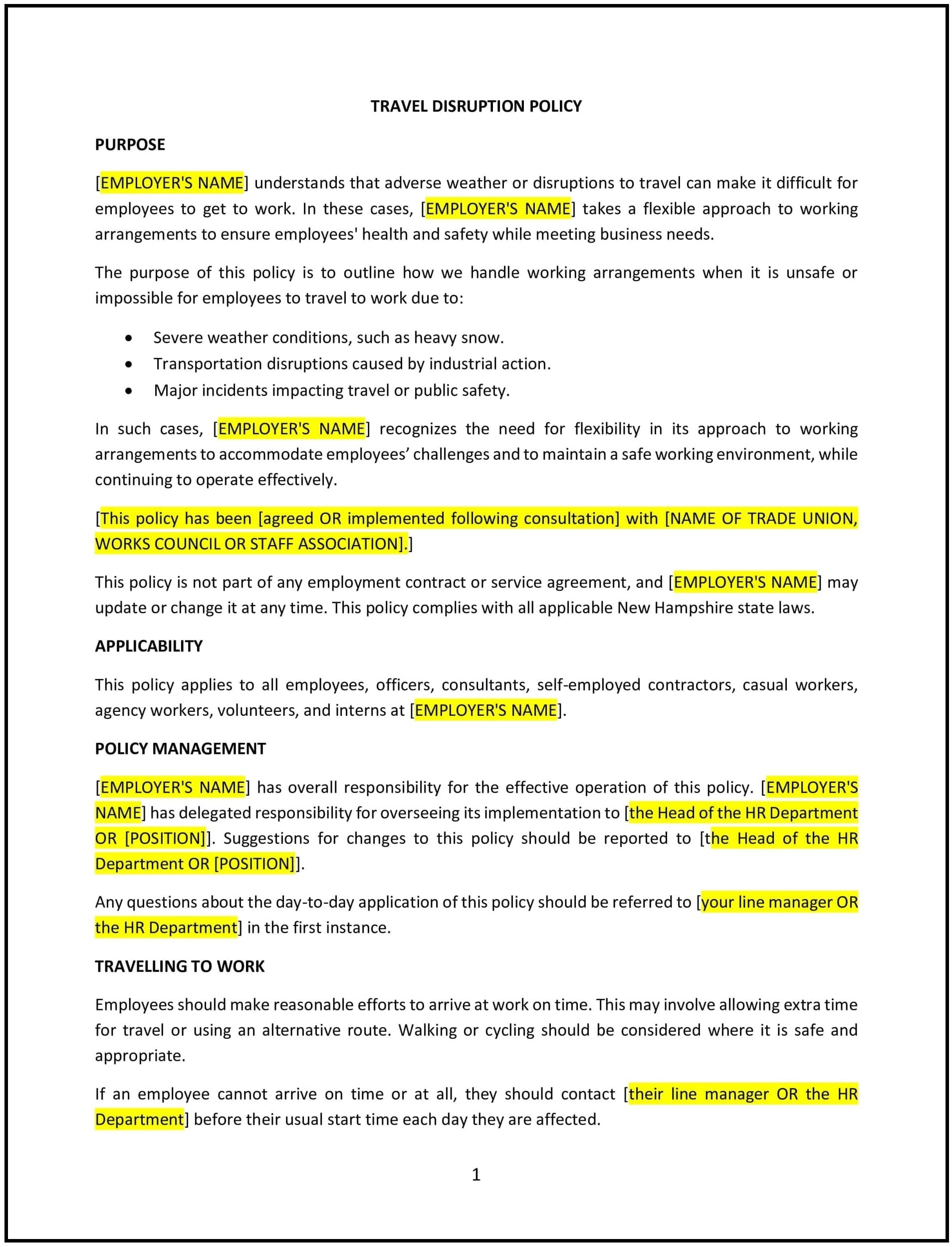Travel disruption policy (New Hampshire): Free template
Got contracts to review? While you're here for policies, let Cobrief make contract review effortless—start your free review now.

Customize this template for free
Travel disruption policy (New Hampshire)
A travel disruption policy helps New Hampshire businesses manage unforeseen disruptions in travel plans, whether for employees on business trips or those traveling for company-related purposes. The policy outlines the steps employees should take when their travel plans are impacted by disruptions such as delays, cancellations, or other travel-related issues. It provides clear guidance on how to handle rescheduling, accommodation arrangements, and other related concerns.
By implementing this policy, businesses can minimize disruptions to operations, ensure that employees are supported during travel issues, and maintain business continuity in the event of unexpected travel challenges.
How to use this travel disruption policy (New Hampshire)
- Define types of disruptions: Specify the types of disruptions covered under the policy, such as flight delays, cancellations, weather-related issues, transportation strikes, and other travel-related obstacles.
- Provide a reporting procedure: Establish a clear procedure for employees to report travel disruptions to their supervisor or HR, including required information such as the nature of the disruption, updated travel arrangements, and estimated arrival times.
- Set expectations for rescheduling: Outline the steps employees should follow when rescheduling flights or other travel arrangements, including who is responsible for making the changes (employee or company) and the timeframes for rescheduling.
- Address accommodation arrangements: Provide guidance on how accommodation will be handled in the event of an overnight delay or extended travel disruption, including whether the company will cover costs or if employees are responsible for booking and reimbursement.
- Clarify compensation and expenses: Specify whether employees will be compensated for extra time or expenses incurred due to travel disruptions, such as meals, transportation, or lodging.
- Ensure communication with clients or partners: Set expectations for employees to inform any relevant clients, customers, or partners about their delayed arrival and to reschedule meetings or appointments as necessary.
- Offer support during disruptions: Make clear how the company will support employees during disruptions, including help with rebooking, arranging accommodations, or assisting with logistics.
- Review and update: Periodically review and update the policy to reflect any changes in travel booking processes, company requirements, or external factors affecting travel.
Benefits of using this travel disruption policy (New Hampshire)
This policy provides several benefits for New Hampshire businesses:
- Minimizes operational impact: By providing a clear procedure for handling travel disruptions, businesses can ensure that employees know how to manage these issues efficiently, minimizing delays to operations.
- Supports employee well-being: Employees can feel confident that they will be supported and reimbursed for any reasonable expenses incurred due to travel disruptions.
- Enhances business continuity: By setting clear expectations for rescheduling and communication, businesses can ensure that disruptions do not significantly impact ongoing projects or relationships with clients.
- Promotes accountability: The policy holds employees accountable for managing travel disruptions in a timely and efficient manner, ensuring minimal disruption to the company’s operations.
- Protects the business’s reputation: A well-defined travel disruption policy shows that the company values professionalism and is committed to managing external challenges effectively.
Tips for using this travel disruption policy (New Hampshire)
- Communicate the policy clearly: Ensure that employees are aware of the policy and understand how to report disruptions, reschedule travel, and access support if necessary.
- Make employees aware of procedures: Provide employees with a step-by-step guide for dealing with travel disruptions, including who to contact, what information to provide, and how to arrange for accommodations.
- Be flexible with rescheduling: While maintaining operational efficiency, provide flexibility when rescheduling travel to accommodate employees’ needs, ensuring minimal impact on business operations.
- Keep records: Maintain documentation of all travel disruptions, including updated travel details and expenses incurred, to streamline reimbursements and ensure accurate record-keeping.
- Regularly review travel logistics: Stay updated on potential external factors that may affect travel (e.g., weather events, transportation strikes), and adjust the policy as needed to address these concerns.